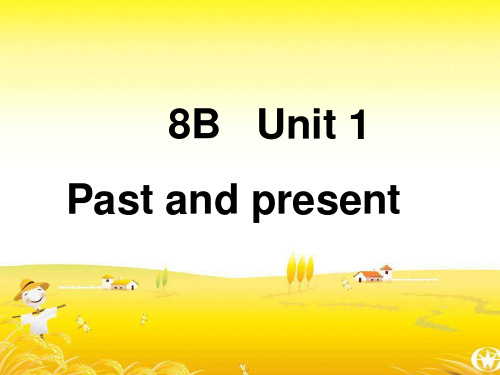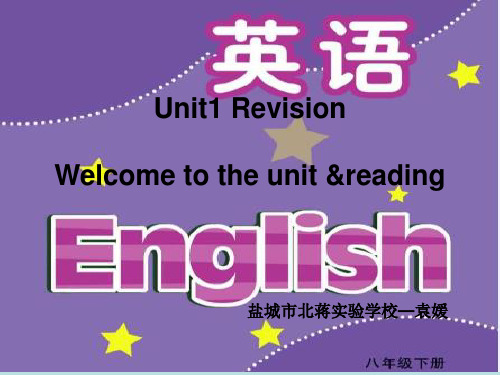牛津8Bunit1 语法PPT课件
合集下载
8B Unit 1(Welcome to the unit)课件

Underground (since 2002)
double-decker (since1990)
plane (since 1958)
train (since 1909)
light rail (since 1971)
coach (since 1958)
taxi (1913)
Read the following sentences and guess which form of transport they are describing:
Have you seen this new film? Have they come ?
Guessing games
It is very fast, but it is very expensive.
Plane.
It is a kind of bus ,it usually travels between two cities.
Coach.
1 What is this? 2 Did we have the bus in Beijing? 3 When did we have the bus in Beijing? 4 How long have we had the bus in Beijing? We have had the bus since 1935.
Draw a timeline for the different forms of transport in Beijing
The bus has appeared in Beijing since 1935. 1920 1930 1940 1950 1960
past bus
ent
Homework:
牛津译林版英语8B unit 1 grammar (共40张PPT)

10 grow
11 hit
grew
hit
12 enjoy enjoyed
五:现在完成时的时间副词和时间短语:
• • • • • • • • already: 肯定句,表示已经发生 ever: 疑问句,表示“曾经” for: 肯定句/疑问句/否定句,表示一段时间 just: 肯定句,表示“刚刚” never: 否定句,表示“从不” recently: 肯定句/否定句/疑问句,表示“最近” since: 肯定句/否定句/疑问句, 表示“自---以后” yet: 疑问句/否定句, 表示“已经”或者“还没 有”
四、 过去分词的构成
(A) 规则动词:规则动词的过去分词的构成规则与规 则动词的过去式的构成规则相同。四点变化规则:
(1)、一般动词,在词尾直接加“ ed ”。 work---worked---worked, visit---visited---visited (2)、以“ e ”结尾的动词,只在词尾加“ d ”。 live---lived---lived , (3)、以“辅音字母 + y ”结尾的动词,将 “y” 变为 “i” ,再加“ ed ”。 study---studied---studied, cry---cried---cried (4)、重读闭音节结尾,末尾只有一个辅音字母,先双 写该辅音字母,再加“ ed ”。 stop---stopped---stopped, drop---dropped--dropped
e.g. Have watched _______you __________the film?(watch) Yes, I _______. have
Has _______your father watched ________the film?(watch) No, he _______. hasn’t
优秀课件牛津译林版8下Unit1 Grammar课件 (共18张PPT)

3. 一般疑问句及回答: 将have/has提到句首
Have/Has + 主语 + 过去分词---? Yes, --- have/has. No, --- haven’t/hasn’t.
e.g.
_______you _______the film?(watch) Have watched Yes, I _______. have Has watched _______your father ________the film?(watch) hasn’t No, he _______.
2. 否定句:
主语 + have/has + not + 过去分词
e.g. They haven’t _______________ finished their homework yet. (finish)
He _______________ hasn’t finished his homework yet. (finish)
His grandfather has been dead for 3 years. 他的爷爷去世三年了。 2. 过去发生的某一动作对现在造成的影响 Eddie has eaten Hobo's food. 埃迪吃了我的食物。 3.从过去到现在某一动作发生的次数 I have seen the film three times. 这部电影我已经看了三遍了。
对for/since引导的时间词提问用How long
8. 其它:so far 到目前为止 over/during the years 在过去的数年期间 in the past ten years 在过去的十年里 twice/many times 两次/许多次 over the past century在过去的一个世纪里
8B牛津Unit1 Welcome to the unit (共41张PPT).ppt

Check now!
bus
We almost see the buses everywhere in the cities. We usually get on the bus at the front door and get __o_f_f___ it at the back door.
/ǝʊ/
past and present an hour ago(用于一般过去时)
3.你已经变了。
You have changed.
4.你见到我的食物了吗?Have you
5.我刚吃了
I have
seen my food? (* see-saw-seen)
/∧/
j_u_st
eaten
it.(*eat-ate-eaten)
1.过去和现在
2.你已经变了。
3.我刚吃了 4.过去常与我共享食物 5.环游全城 6.去其他城市 7.不同时期的交通工具
past and present You have changed. I have just eaten it.
used to share food with me go around the city go to other cities transport at different times
Let’s play a game to guess what the
transport is.(Race to be the first.抢答)
It is the fastest way of travelling to a
place far away, but it will cost you a lot
Байду номын сангаас
牛津译林版八年级下册8B unit1 welcome to the unit(共43张PPT)

2. How do you and your friend go to school at present?
3. How did your father/mother go to work in the past?
Transport at different times
coach bus
underground taxi
1. Eddie, have you seen my food?
Eddie, 你看见我的食物了吗?(你知道我的食物在哪儿吗?)
base formsimple past past participle
原形
过去式
过去分词
see
saw
seen
hent perfect tense)”,表 示过去的动作一直延续到现在,或与现在有一定联系]
Listen and answer
Listen to the dialogue between Eddie and Hobo and answer the following questions:
1.Where was Hobo’s food an hour ago? It was in the bowl.
I go to work by e-bike every day.
• How do you go to school every day?
If I want to go to the USA, how can I get there?
plane
Free Talk
1. Where did you go during this winter holiday? How did you go there? Why?
go to other cities by coach
3. How did your father/mother go to work in the past?
Transport at different times
coach bus
underground taxi
1. Eddie, have you seen my food?
Eddie, 你看见我的食物了吗?(你知道我的食物在哪儿吗?)
base formsimple past past participle
原形
过去式
过去分词
see
saw
seen
hent perfect tense)”,表 示过去的动作一直延续到现在,或与现在有一定联系]
Listen and answer
Listen to the dialogue between Eddie and Hobo and answer the following questions:
1.Where was Hobo’s food an hour ago? It was in the bowl.
I go to work by e-bike every day.
• How do you go to school every day?
If I want to go to the USA, how can I get there?
plane
Free Talk
1. Where did you go during this winter holiday? How did you go there? Why?
go to other cities by coach
8B Unit1 知识点归纳ppt课件

精选课件ppt
3
I usedn’t to swim in this river./ I didn’t use to swim in this river. 否定句
疑问式Did sb use to do sth?或Used sb to do sth?
Did she use to swim in the river?=Used she to
9. wife (pl. wives) n. 妻子the fishermen’s wives 渔 民们的妻子们
10. block n. 街区
My home is two blocks away from your home.
11. over prep. 在…期间
Has the area changed a lot over the years? 这些 年这个地区变化很大吗? He has learned about two thousand English words over/ in / during精选th课件epppt ast three years. 11
不能说成They have got married for 5 years.
也不能说They have married for five years. 因为
精选课件ppt
10
get 和marry 为短暂性动词。
〈用法拓展〉marriage n.婚姻
They will celebrate their fifty years of marriage next month .
This is the most interesting book that I have ever read.这是我曾经看过的最有趣的一本书。
牛津译林版8B Unit1 Past and Present Grammar课件(共28张PPT)

double the consonant + ed
stop→ stopped
写出下列动词的过去式和过去分词 : repair repaired repaired verb+ed finish finished finished move moved moved 以e结尾+d live lived lived
8B Unit 1 Past and Present
Grammar
Learning aims
1. To master the structure and basic usage of present perfect tense(PPT).
(掌握现在完成时的基本结构、用法。)
2. To learn the rules of forming the past participle of verbs.
stop plan stopped stopped planned planned 双写+ed
study studied studied hurry hurried hurried
(学习动词的过去分词变化规则。)
3. To learn some time expressions usually used in PPT.
(学习常用在现在完成时里的时间表达方式。)
Lead-in Ask and answer
1. How long has Mr. Chen lived in Sunshine Town? He has lived here since he was born. 2. Can Mr. Chen see his old friends as often as before? No. Because most of his old friends have moved away.
牛津译林版英语8B Unit1 Grammar课件(共37张PPT)

(2)现在完成时谈论发生在过去并跟
现在有联系的动作。(汉语中常用“已 经”、“过”、“了”等表达) 通常与
时间副词just(句中), already(句中,句
末), before (句末), yet(句末), never(句
中), ever(句中),recently (句末)等连用。
例如:
1.Eddie刚刚吃了我的食物。 Eddie has just eaten my food. 2.我以前从未听说过那件事。 I have never heard of that before. 3.你曾经骑过马吗? Have you ever ridden a horse? 4.她早已经完成这个工作了。 She has already finished the work. 5.我们还没有完成作业。 We haven’t finished our homework yet. 6.近来我没有收到他的来信。 I haven’t heard from him recently.
What have you eaten for breakfast?
过去分词的构成
(A) 规则动词:规则动词的过去分词的构成 规则与规则动词的过去式的构成规则相同。 四点变化规则(同过去式的构成):
(1)、一般动词,在词尾直接加“ ed ”。 finish---finished---finished (2)、以“ e ”结尾的动词,只在词尾加“ d ”。 change---changed---changed , (3)、以“辅音字母 + y ”结尾的动词,将 “y” 变 为 “i” ,再加“ ed ”。 carry---carried---carried (4)、重读闭音节结尾,末尾只有一个辅音字母, 先双写该辅音字母,再加“ ed ”。 stop--stopped--stopped
牛津英语 8B Unit1 Unit Grammar课件ppt

《课课练》p7 句型转换
Keys: • have worked • Has turned, has • Have cooked, haven’t • hasn’t, yet • haven’t told • How long
现在完成时
过去分词的构成
上一页
主菜单
下一页
规则动词
不规则动词
Base form Past participle Base form Past participle
上一页
主菜单
下一页
现在完成时
现在完成时的主要用法
上一页
主菜单
下一页
现在完成时
现在完成时的基本结构
上一页
主菜单
下一页
现在完成时的基本结构 (1)肯定句:
I/We/You/They + 助动词have + p.p(过去分词)+其它。 He/She/It + 助动词has + p.p(过去分词)+其它。
cried
say
said
watch enjoy
watched enjoyed
grow hit
grown hit
用现在完成时完成下列句子: (p 14)
1.They _h_a_v_e__f_in_i_s_h_e_d__(finish) their homework already. 2. John __h_a_v_e__ never _v_i_s_i_te_d_ (visit) China. 3. Mr Li __h_a_s__r_e_p_a_i_re_d__(repair) over ten bicycles
(我刚才丢了钢笔)
She_h_a_s __ just _b_o_ug_h_t(buy) a book. She__b_o_u_gh_t_ (buy) a book just now.
牛津英语8BUnit 1 第1-3课时(共27张PPT)

after dinner.
Reading
Fill in the blanks with proper words or phrases, according to the conversation.
Daniel’s grandpa, Mr Chen knows
Sunshine Town _w_e_l_l. He _h_a_s_l_iv_e_d_ there since he was two years old. He
first lived in the _so_u__th_e_r_n_ part of the town with his parents.
When he g_o_t_m__a_r_r_ie_d_ in 1965, he moved to another flat _in__th__e_c_e_n_t_er__o_f town. Last year, his _c_h_il_d_r_e_n bought a new flat for him, so he moved again. Sunshine Town _h_a_s_c_h_a_n_g_e_d__a_l_o_t. In the past, there were about 30,000 people living there.
There were their own shops, small restaurants and m__a_r_k_e_t_s_t_a_ll_s. There was an old cinema and a small post office. Now, the place _h_a_s_t_u_r_n_e_d_i_n_t_o a park. Mr Chen misses his old friends very much. So he and his old friends meet in the new park _to__p_la_y__c_a_r_d_s and Chinese chess. It’s very _p_l_e_a_s_a_n_t for them.
Reading
Fill in the blanks with proper words or phrases, according to the conversation.
Daniel’s grandpa, Mr Chen knows
Sunshine Town _w_e_l_l. He _h_a_s_l_iv_e_d_ there since he was two years old. He
first lived in the _so_u__th_e_r_n_ part of the town with his parents.
When he g_o_t_m__a_r_r_ie_d_ in 1965, he moved to another flat _in__th__e_c_e_n_t_er__o_f town. Last year, his _c_h_il_d_r_e_n bought a new flat for him, so he moved again. Sunshine Town _h_a_s_c_h_a_n_g_e_d__a_l_o_t. In the past, there were about 30,000 people living there.
There were their own shops, small restaurants and m__a_r_k_e_t_s_t_a_ll_s. There was an old cinema and a small post office. Now, the place _h_a_s_t_u_r_n_e_d_i_n_t_o a park. Mr Chen misses his old friends very much. So he and his old friends meet in the new park _to__p_la_y__c_a_r_d_s and Chinese chess. It’s very _p_l_e_a_s_a_n_t for them.
牛津译林版英语8B Unit1 welcome(共25张)PPT幻灯片

You’ve changed too. You used to be so kind to me.
15
根据课文内容填空:
Hobo’s food _w_a_s_ in the _b_o_w_l_ an hour ago. But it isn’t there now. Why? Eddie has just _e_a_te_n_ it because he was _h_u_n_g_r_y_. Hobo thinks Eddie has _c_h_a_n_g_e_dbecause he _u_s_e_d_ _to__ share food with Hobo. While Eddie thinks Hobo isn’t _k_in_d_ to him any more.
next one.
Millie : Really ? I go to school by bus . Now it’s easy
and fast.
8
Work in pairs and take turns to talk about it. Use the conversation below as a model. A:How did you go to school when you were a
Why not t_o_o__ _m_a_n_y__ and f_a_s_t__.
take a bus? people and it took a _lo_n_g__ _ti_m__e_ to wait.
7
Past
Present
go to school
on foot,
by bike/bus
by bike/ bus /underground
What about Eddie and Hobo? Have they changed? Listen to the conversation between Eddie and Hobo and answer the following questions:
15
根据课文内容填空:
Hobo’s food _w_a_s_ in the _b_o_w_l_ an hour ago. But it isn’t there now. Why? Eddie has just _e_a_te_n_ it because he was _h_u_n_g_r_y_. Hobo thinks Eddie has _c_h_a_n_g_e_dbecause he _u_s_e_d_ _to__ share food with Hobo. While Eddie thinks Hobo isn’t _k_in_d_ to him any more.
next one.
Millie : Really ? I go to school by bus . Now it’s easy
and fast.
8
Work in pairs and take turns to talk about it. Use the conversation below as a model. A:How did you go to school when you were a
Why not t_o_o__ _m_a_n_y__ and f_a_s_t__.
take a bus? people and it took a _lo_n_g__ _ti_m__e_ to wait.
7
Past
Present
go to school
on foot,
by bike/bus
by bike/ bus /underground
What about Eddie and Hobo? Have they changed? Listen to the conversation between Eddie and Hobo and answer the following questions:
牛津译林8BUnit1Grammar课件(49张)

6.All of them are p_l_e_a_s_e_d____with that _p_le_a_s__a_n_t_trip.(please)
7.Sally became a member of the company after the job_i_n_te__rv_i_e_w__(面试)
---Yes. It_h_a_s__c_h_a_g_e_d__a lot in the past few years(change)
3.Do you know the movie Lost in Thailand?
---Yes. I _h_a_v_e__s_e_e_n__(see) it twice. It's funny.
17.我的大多数老朋友 17.most of my old friends
18.和过去一样频繁地见到
彼此
18.see each other as often as before
19.打牌,下中国象棋 19.play cards and Chinese chess
20.采访某人
20.have an interview with sb
10. I'm sure you will be _b__e_tt_e_r(good) at English if you work harder.
11.I'm sorry I can't get on the bus because I _h_a_v_e__le_f_t_(leave) my ticket in the office.
over the years.
Translate the following phrases
1.自从我出生 1.since I was born
牛津英语 8B Unit 1Integrated skill A课件ppt

Last week, I _b_o_r_r_o_w_e_d__a_b_o_o_k__a_b_o_u_t__ Beijing’s _p_a_s_t_a_n_d__p_r_e_s_en__t ___.
3. 当地人们过去居住在旧房子里,而现 在大多数已搬进了新公寓。 __L_o_c_a_l_p_e_o_p_l_e_u_s_e_d__to__li_v_e____ in old houses, but now most of them __h_a_v_e_m__o_v_e_d__in_t_o____ the new flats.
4. He has just _r_e_tu_r_n_e_d_ (返回) from Dalian.
二、翻译句子: 1. 在这几年里,星光镇已大变样了。
Starlight Town __h_a_s_c_h_a_n_g_e_d__a_l_o_t___ over the years. 2. 上周,我借了一本关于北京的过去与现 在的书。
4. Half an hour _h_a_s_p_a_s_s_e_d_ (pass) since the train __l_e_ft_____ (leave).
5. Mary __h_a_s__ just _l_o_s_t_ (lose) her pen. _H__a_s_ she __se_e_n__ (see) it anywhere?
6. __H_a_v_e___ you _fo_u__n_d__ (find) your watch yet?
7. ---Are you thirsty? ---No. I __h_a_v_e__ just __h_a_d___ (have) some orange.
8. We __h_a_v_e_ already _r_et_u_r_n_e_d_ (return) the book.
3. 当地人们过去居住在旧房子里,而现 在大多数已搬进了新公寓。 __L_o_c_a_l_p_e_o_p_l_e_u_s_e_d__to__li_v_e____ in old houses, but now most of them __h_a_v_e_m__o_v_e_d__in_t_o____ the new flats.
4. He has just _r_e_tu_r_n_e_d_ (返回) from Dalian.
二、翻译句子: 1. 在这几年里,星光镇已大变样了。
Starlight Town __h_a_s_c_h_a_n_g_e_d__a_l_o_t___ over the years. 2. 上周,我借了一本关于北京的过去与现 在的书。
4. Half an hour _h_a_s_p_a_s_s_e_d_ (pass) since the train __l_e_ft_____ (leave).
5. Mary __h_a_s__ just _l_o_s_t_ (lose) her pen. _H__a_s_ she __se_e_n__ (see) it anywhere?
6. __H_a_v_e___ you _fo_u__n_d__ (find) your watch yet?
7. ---Are you thirsty? ---No. I __h_a_v_e__ just __h_a_d___ (have) some orange.
8. We __h_a_v_e_ already _r_et_u_r_n_e_d_ (return) the book.
牛津译林版8B Unit 1 Past and present Grammar (共43张PPT)

4.My brother has drunk a bottle of juice.(划线部分提问 )
5.Jim have lived in Beijing for one year. (划线部分提问 )
现在完成时
现在完成时的时间状语
上一页
主菜单
下一页
1. You have already finished the homework. 2. I have stayed at home for 20 days. 3. Many people have seen the film many times. 4. He/She has just cleaned the blackboard. 5.I have lived in Huai’an since I was born. 6.I have taught English since I came to this school. 7.You have learned English for 6 years.
(我刚才丢了钢笔)
She_h_a_s__ just _b_o_u_g_ht(buy) a book. She__b_o_u_g_h_t (buy) a book just now.
(她刚才买了本书)
上一页
下一页
Tips 用表示到说话时为止的时间状语, 如 : just, before, up to now, the past/last few years等。
上一页
下一页
Tips
★just, recently是完成时的时间状语, just now 有a moment ago 之意,是 一般过去时的时间状语。
I____lo_s_t(lose)my pen just now. I__ha_v_e__ just _l_o_st__(lose)my pen .
5.Jim have lived in Beijing for one year. (划线部分提问 )
现在完成时
现在完成时的时间状语
上一页
主菜单
下一页
1. You have already finished the homework. 2. I have stayed at home for 20 days. 3. Many people have seen the film many times. 4. He/She has just cleaned the blackboard. 5.I have lived in Huai’an since I was born. 6.I have taught English since I came to this school. 7.You have learned English for 6 years.
(我刚才丢了钢笔)
She_h_a_s__ just _b_o_u_g_ht(buy) a book. She__b_o_u_g_h_t (buy) a book just now.
(她刚才买了本书)
上一页
下一页
Tips 用表示到说话时为止的时间状语, 如 : just, before, up to now, the past/last few years等。
上一页
下一页
Tips
★just, recently是完成时的时间状语, just now 有a moment ago 之意,是 一般过去时的时间状语。
I____lo_s_t(lose)my pen just now. I__ha_v_e__ just _l_o_st__(lose)my pen .
牛津译林版 8BU1grammar1课件(共12张PPT)

t2h021i/s6/20dialogue twice.
5
注意:当在肯定陈述句中含有already或just 时,在转换成否定句或疑问句时,要把句中的 already 或just 去掉,在句末加上yet.
● I have seen the film already.
I haven’t seen the film yet.
I _ha_v_e_d_o_ne__ (do) my homework already.
He h_a_s_n_ot_f_in_is_h_e_d___(not finished) his
homework yet.
_H_a_v_eyou ever __b_ee_n_(be) to Beijing?
(learn)a lot about Beijing’s past and present.
2021/6/20
10
It’s a good exhibition and I h_a_v_e_d_e_ci_d_ed
(decide) to see it again .Do you want to go with me ?
recently, Sandy?
S : No, Ih_a_v_e_n_’_t_.What about you?
M : Well, I _h_a_v_e__s_e_e_n____ (see) one. I saw
it at the history museum last week .
S : What is it about?
2. Mr. And Mrs.Li __h_a_v_e__n_o_t_c_o_m__e___(not come)
back yet.
3. John__h_a_s__b_e_e_n_ (be)to the USA a few times.
相关主题
- 1、下载文档前请自行甄别文档内容的完整性,平台不提供额外的编辑、内容补充、找答案等附加服务。
- 2、"仅部分预览"的文档,不可在线预览部分如存在完整性等问题,可反馈申请退款(可完整预览的文档不适用该条件!)。
- 3、如文档侵犯您的权益,请联系客服反馈,我们会尽快为您处理(人工客服工作时间:9:00-18:30)。
7. Tom ____be_g_a_n____ (begin) to learn Chinese last year.
6. Last week we _p_i_ck_e_d____ (pick) many apples on the farm.
9. My mother ____d_id_n_’t_d_o_______ (not do) housework yesterday.
Past
present
Past
Eddie has lived with Millie for four years.
present
4 years
★一、since短语或从句表示过去的动
作延续至今,since之后的时间为一点。
Mr. Smith has worked here since 1984.
(1984年以来,史密斯先生一直在这工作。)
simple past tense and the present perfect tense.
1 Questions about Reading:
• (1) How long has Mr. Chen lived in Sunshine Town?
He has lived in Sunshine Town since he moved there with his family when he was two years old.
8B
Unit 1 Past and Present
Grammar (A)
Learning aims
• 1.To know the present perfect tense. • 2.To master the structure of the PPT. • 3.To learn the differences between the
一般过去时练习
1
•
I.改错题 1.How is
Jane
yesterday?
_____Is_改__为__w_a_s_________
• 2.He go to school by bus last week. ________G_o_改__为__w_e_n_t___________ 3_4_..HIG_ce_oa_oen_fstf_改ely_n_为kg_itow_ee_ses_ns_the_ov_em_ne_y_ae_ta_6r_s:0_a0_g_loa_.s_t__m__o_n_th_C._a_n_改__为__c_o_u_ld______________
to bed until 12 o’clock yesterday morning.
last
4. There ___w_a_s____ (be) no one here a moment ago.
5. 6.
I I
____c_a_lle_d____ (call) Mike this morning. listened but ____h_e_a_rd____ (hear) nothing.
He feels a bit lonely.
The simple past Tense
We use the simple past tense to talk about what happened at a definite time in tsent
Eddie was born four years ago.
The Present Perfect Tense
现在完成时态
特征:1.We use the present perfect tense to talk about things that started in the past and continue to the present.
Eddie has lived with Millie since he was born.
He’s learned about 5,000 English words since he went to college.
(他上大学以来大约学了五千个英语单词。)
上一页
下一页
★二、for短语表示动作延续多长时 间,for的宾语为时间段。
1.We have known each other for twenty years. (我们认识有二十年 了。)
• ____________d_id_n_’t_改__为_d_i_d_n_’t_d_o___________ 8.He wait for you three hours ago. ______________w_a_it_改__为__w_a_it_e_d___________
• 9.Who find it just now ? ________F_i_n_d_改__为_f_o_u_n_d_____________________
• 5.Did you saw him just now. ________S_a_w_改__为__s_e_e___________________ 6__. _T_o_m__w_a_s_n_’t_w_a__tc_h_T__V_l_a_s_t _n_ig_h_t.__w_a_s_n_’_t改__为didn’t 7.I didn’t my homework yesterday.
一般过去时练习2
• 用所给词的适当形式填空
1. Tom and Mary ____ca_m__e___ (come) to China last month.
2. Mike night. So 3. Mary
h_e_______dg__ido__nt__’t_(g_go_e_t _) _u_p_l(anteo.t go) ____re_a_d____ (read) English
• (2) When did Mr. Chen get married?
In 1965
• (3) There have been many changes in this town. What has the centre of town become?
It has become a park.
(4) How does Mr. Chen feel from time to time?
